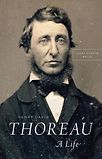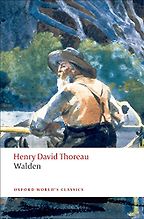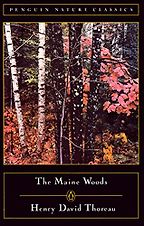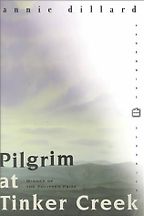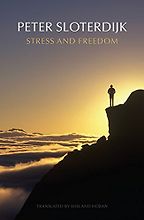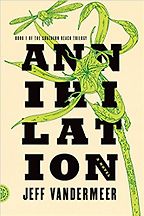Many of us will be familiar with Thoreau’s most famous book Walden, a paean to simple living, or the many pithy aphorisms attributed to him—one of the best known being that “the mass of men lead lives of quiet desperation.” But who was Henry David Thoreau?
Gosh, where to start. Thoreau was born in Concord, Massachusetts from, on his mother’s side, an old New England Scots-Quaker family, and on his father’s side, a French Huguenot immigrant who settled in Boston. Both families had fought in the Revolutionary War, but on opposite sides. I’ve often wondered about Thoreau’s growing up in Concord, the cradle of the Revolutionary War, amidst a family that had seen such division in their own ranks—what kind of independent-mindedness must he have learned, growing up in that kind of environment?
His parents were not wealthy. They could afford to send—if they scrimped and saved—one son to Harvard, and the son they chose was the younger, because he was studious and bookish. So Thoreau attended Harvard essentially as a scholarship student.
When he was growing up, nature was still a part of daily life, in a very rural environment. But it wasn’t until after his brother died—they were very close, spending their childhood rambling out in nature, taking adventures on the rivers and in the woods and so on—that there was a shift in Thoreau’s thinking. He started thinking less about being a closet scholar in the mould of Ralph Waldo Emerson, his mentor, and instead developed a sense that connecting deeply to nature was the way to reconnect with his lost brother.
And this wish of connecting with nature was the drive behind his move to the cabin at Walden Pond, in the woods near Concord?
When he went to Walden, the goal was, on one hand, very practical: to write his first book, A Week on the Concord and Merrimack Rivers, as a memorial to his brother. The book that we love as Walden began there, in the journal entries that he wrote starting with his first day at the pond, where he immediately sounds the strong voice that we hear in Walden. But the voice of A Week is very different, quiet and meditative—both joy in life, and mournfulness for all that was lost, the natural world that was passing, that the two brothers had shared. It’s a very interesting mix, that, putting all these elements together.
He grew up in a family of four children. The father ran a pencil factory attached to their home, and the mother ran their household as a boarding house. So, except when he was at the pond, Thoreau was always in big bustling households with lots of people around. So the notion that he was any sort of a hermit is a little hard to sustain. He was a bit eccentric, to be sure, but unless he was out walking alone, he was almost always surrounded by people.
In discussions of Walden, this point often comes up. People can feel betrayed, I think, when they find out that he had regular visitors at the cabin, that he had his laundry done for him. Do you see disingenuousness in the omission of these facts from his account of ‘life in the woods’?
I think it’s best to understand Walden as, in the best sense of the word, a work of fiction. By that I don’t mean ‘it’s lies.’ It’s a work of art. It’s a kind of turning inward that becomes a turning outward, a question of discovering who he truly is, and what life truly is when it’s not being determined by all the social forces that we’re surrounded with. These can be the intimate social forces of any bustling household, or the conventions of town life, or the pressures of a very fraught political environment. Remember that this was the era leading up to American Civil War, and virtually all the women in his family—his mother, sisters, several of his aunts—were deeply involved in grassroots abolitionism. In fact, I think another reason for going to Walden was to sort himself out on this matter—to work out a whole world view, independently for himself, so he could return and engage with abolitionism and social reform in terms that felt true to him.
Sure, this required a certain distance. But it’s interesting—the philosopher Stanley Cavell said something that still rings in my thoughts about Thoreau: the distance was “just far enough to be seen.” The Walden house was on the edge of town, near a main road, in sight of the railroad—a little distanced, but therefore, very conspicuous. People came because he was visible, and they were curious. You know, he could have put up a ‘keep out’ sign, but he didn’t. That to me is revealing.
Instead, he developed a system: he’d put a chair out in front of the house if he was open to visitors. The chair was often out, and anybody who wanted could come by and talk. And when he removed the chair, it meant, ‘please respect my privacy, I’m working.’ Which meant, of course, that he was writing. People learned to respect that—and he got rude with those who didn’t. I called it “performance art” in my book, probably the most quoted sentence: I’ve known performance artists, and I think that it’s useful to understand Walden as a kind of deliberate, thoughtful, public performance, one that rings true because it was true. It allowed him to develop a deep part of his own thinking and belief in an authentic way.
“I think that it’s useful to understand Walden as a kind of deliberate, thoughtful performance art”
It never occurred to him, and it never occurred to his family, that he should be isolated. He loved his family, they were very close, and he still had responsibilities—so, they visited on Saturdays and he went home for Sunday dinners. And he does admit this in Walden, too, but people read right past it. As for laundry, Rebecca Solnit asked the right question: What other male author is condemned for not doing his own laundry? In any case, laundry was the job of the family’s Irish servants.
I’ve wondered why we make this into a problem. Why would we reject the notion that he could have a loving relationship with close family? That he would go see then, and they would come visit him? That he had friends who would spend an afternoon or an evening solving the problems of the world with Henry? I mean, yes, there’s something attractive about the hermit, the monk. But total isolation was never the plan. As for monks, this was Protestant New England. He had no monastic models—although Thomas Merton shows the deep spiritual continuity.
As well as a writer and a thinker, he was also a naturalist. I understand that his work on forest succession was very much sort of the cutting edge of the time.
Yes, it was. It was well known in New England that if you cut down an oak forest, a pine forest would quickly sprout in its place. And if you cut down a pine forest, an oak forest would replace it. People had noticed this, but were immensely puzzled by it. It was a puzzle to Charles Darwin, too, and he actually mentions it in Origin of Species.
Thoreau, who was earning his living as a land surveyor, hadn’t thought much about this until one of his assistants asked him, “Why is this, do you think?” Thoreau had no answer, and the realization that nobody else did, either, really got his mind going. He started to do what he did best, which was to study and hypothesize and develop a holistic—now we would say ecological—understanding of it. This was later in the 1850s, years after the publication of Walden. He spent the rest of his life elaborating on the ideas prompted by his initial insight.
Near the end of his life, in September 1860, Thoreau was invited to give an address at the county fair, titled ‘The Succession of Forest Trees.’ His audience loved it, and it was reprinted all over the country. It was a very exciting philosophical, but also practical, solution to a problem, offering insight into the deeper workings of the organic world around us. While it’s now credited as a pioneering study in ecology, of course the concept of “ecology” hadn’t come into existence yet; without realizing it, Thoreau was pioneering a scientific field. And his research and analysis and conclusions have stood the test of time. They’ve been elaborated greatly in the decades since, but everything that he said has held up scientifically.
Speaking of his status as a pioneer, the second book you’ve chosen, The Maine Woods—which describes ancient forests and rails against the despoilment of them—was published before the writing of John Muir. So, could Thoreau be seen as a father of the environmental movement?
Well, the environmental movement had many fathers, and mothers too; but Thoreau was one of the first to put it into words, inspiring people to take further steps toward both preservation of wilderness areas and better conservation of the wild commons. John Muir’s chosen motto for the Sierra Club was: “In Wildness is the preservation of the world.” And that, of course, comes out of one of Thoreau’s essays, ‘Walking.’
You mentioned this is a good companion book to Walden. How so?
Well, Walden is the book written about dwelling, and home, and deep, deep associations with a place that you grew up in. Thoreau tells us his first memory of Walden was being brought there as a child of five, on a family picnic. The book is so deeply layered because there he is again, as an adult, remembering all those years and all the unfolding changes he’d witnessed. Maine Woods is completely different. It’s a strange environment, even an alien environment, for him. And the meaning of it startles him, eludes him—and draws him deeply. So, the first of this book’s three linked essays narrates his first encounter with true deep wildness. And it becomes pivotal. This all occurs during his first full summer at Walden.
While trying, and failing, to summit Mount Katahdin, a revelation occurs: he realizes that he’s traversing an ordinary pasture, only this is not a pasture—no human being made this landscape what it is. It’s completely not human, yet to him it feels strangely, uncannily, deeply familiar. Of course, you don’t set up a cabin in such a place. You honour it as sacred, and then you return home. It’s almost a kind of pilgrimage. He was pushing against orthodox Christianity, but you could say that the Maine woods is where he went to meet God.
You mentioned before the influence of Emerson, the famous transcendentalist, on Thoreau. Should we see nature writing as an extension of his religiosity?
I think so. You see in his journal that walking out into the woods took a different purpose after the death of his brother. He carried with him a sense of pain and outrage and difficulty. Thoreau responded the way many of us do, by asking the deeper questions about God. Is there a higher power? How could God have done this—cut off a vital, flourishing, beloved person in the prime of life. Is there meaning to this? Or is this just some kind of obscene accident?
He turned outward to the wider creation, to the natural or non-human world, to try to understand the deeper meaning. Yes, this is a deeply religious impulse. His family was very religious—church-going Congregationalists who, mostly, stayed with the liberal wing as it evolved into the Unitarian Church. Thoreau himself was famously resistant to church-going, and there were complex reasons for that—but ultimately, the formalism of the church didn’t respond to his spiritual need. He had a sense that God was not in a building, not in a group of people. God had to be somewhere, but if not there, where?
Thoreau struggled more than Emerson. I think Emerson felt he had the answer, Thoreau wasn’t so sure. He had to fight for it.
The individualism we see with regard to his church-going also manifested in his writing and social activism. He wrote famously “that government is best which governs not at all.” He spent a night in jail for refusing to pay tax. Was he an anarchist?
Yes. I think in a sense he was. Not in the sense of anarchism as ‘no law, no government’ but rather that we are beings who, if force and coercion are rejected, will build free and cooperative institutions responsive to our higher nature. To the degree that we realize this potential, we won’t need government force, militarized police, jails and so forth. Yes, ‘Civil Disobedience’ starts with that famous line—“that government is best which governs least,” which he then kicks up a notch. But actually, he’s quoting the masthead of the U.S. Democratic Review, in which he’d published a couple of essays—that is, he’s citing a mainstream libertarian position in American politics.
“He turned outward, to the natural world, to try to understand the deeper meaning”
But look what he does next: he takes that sentiment and gives it a twist, turns it inside out by saying what he wants, “speaking practically and as a citizen,” is not no government, but better government. And he adds that that’s exactly the kind of government men will have once they’re ready for it: true democracy, the kind that will protect its citizens—us!—from injustice. And true government, good government, would not force us to commit injustice, either. It’s because the current government has failed in both cases that citizens have the moral duty to resist it. In short, it’s not a call to govern ourselves “not at all,” but a call to govern ourselves better.
Before we move on to his influence on other writers, did Thoreau see widespread recognition in his own lifetime?
Walden sold relatively well. Famously his first book, A Week, didn’t sell at all, but then, it was published by a firm that didn’t do any marketing. Even so, it was widely reviewed and earned him respect as a promising up-and-coming young writer. Walden was reviewed very warmly, including in England, and by his death in 1862, Thoreau had a solid reputation. Not extreme fame, but people who knew him said, ‘you wait, he’s the real thing. It may take time, but later generations will look back and say he was one of the greats.’
Indeed, Thoreau became more famous after his death, to the point where a complete edition of his work was published in 1906—and by complete, I mean even the 14 volumes of his journal. Think about how well known and beloved a writer must be for a commercial publisher to invest in a 20-volume edition of their works. That speaks to a pretty solid rise in fame in a period of less than 50 years.
Your third choice is Annie Dillard’s Pilgrim at Tinker Creek. When we talked before this interview, you described it as a direct response to Thoreau. In what way?
Annie Dillard is clearly in dialogue with Thoreau. She writes a book from a similar stance, which she sketches in terms of a year. So: a year at Tinker Creek, January to December. And the annual cycle becomes a meditative reflection, what she calls a theodicy. What is our relation to God? What is the universe? and what is our place in it? These are exactly the kinds of questions that Thoreau asks, but she’s setting hers in the 20th century. Like Thoreau, she is fascinated by science and philosophy and religion, and reading omnivorously. And dwelling in a place where she can think, take walks, observe, read and think some more. So she’s enacting Thoreau, but in a 20th-century context: she takes on quantum physics, the latest research on DNA and the nature of life, the meaning of Darwinian evolution—well beyond Thoreau’s era, but extending Thoreau’s mantra “to live deliberately.” Even if she hadn’t mentioned his name you would think, Aha, this is enacting Thoreau’s project in a very contemporary way.
But Dillard cites Thoreau frequently, and even when she doesn’t mention his name or allude to him, there are all sorts of wonderful cryptic references or lovely little conceptual puns on Walden. I hadn’t realized this until I re-read it recently, and it’s just a delight. She’s having such fun playing with his language and elaborating on his ways of seeing. It feels like a dance, this rich, playful, marvellous, metaphysical dance with Thoreau.
Her husband is also a Thoreau biographer. So I imagine the spirit of Thoreau must be very much alive in that house.
I’ve never met Annie, but Bob [Richardson, her husband] has been a mentor. I’ve known him for many years. It wasn’t either of them who told me, but I have heard that when she got a copy of Bob’s biography of Thoreau, she said, ‘this is wonderful. I have to meet the man who wrote this.’ So his biography is what drew them together.
That’s wonderful.
It truly is. It’s interesting to me as a biographer to think about the similarities in the kinds of writing they each engage in: Bob Richardson wrote an intellectual biography, and Annie does, as I say, this kind of metaphysical dance where she enacts Thoreau in a completely fresh, free way. And while she doesn’t dwell on gender, the sense that it is a woman enacting this is everywhere, a delightfully wicked, subversive undertow. So, you have two forms of writing, two ways of extending Thoreau’s mode of thinking and acting in the world. Both rather different and yet coming together in this way. I’m very drawn to both.
That question of gender is interesting. As William Cronon observed, “the mythic frontier individualist was almost always masculine in gender.” Dillard, before publishing this book, worried in her diary that it wouldn’t be taken seriously because—as she said herself—she was “a Virginia housewife called Annie.” Is it surprising that Thoreau’s most obvious inheritor is a woman?
You know, I think it’s perfect that Thoreau’s most obvious inheritor is a woman. Partly because Thoreau himself—well, to know him and to know his writing is to know that he’s not stereotypically masculine. Indeed, he’s very puzzled by his own sense of gender. He knows he’s not like other men, and frets a bit over who he is, and how he is the way he is.
Marilynne Robinson is another great inheritor. If I could have had ten books, I would add Robinson’s novel Housekeeping where, again, it’s a woman who takes the Thoreauvian stance, literally setting up housekeeping, like Thoreau, toward the problem of dwelling truly, which means departing from convention.
“I think it’s perfect that Thoreau’s most obvious inheritor is a woman”
I asked this question once many years ago, in a piece called ‘Walden as Feminist Manifesto,’ which actually got some currency. In it, I said that women respond most deeply to what Thoreau has done because we recognize that he is liberating. He’s not asking us to keep house for him, he’s devising a whole other relationship to the household. And it’s a relationship that is, yes, a kind of feminist ideal. Some people thought I was nuts, but a lot of women have written me over the years and said that I put my finger on something.
Years ago I read that many women feel a freedom in nature, freedom in walking alone in the wilderness, taking hikes, backpacking or whatever, because they walk out into the woods as Thoreau did and they’re not gendered. The traps and chains that hold them to certain social roles just drop away. I felt that when I was young. And so it doesn’t surprise me at all that women would step into Thoreau’s framework and say, ah, this gives me the freedom to be whatever it is that I choose to be.
Let’s move on: Stress and Freedom. Why did you choose this book?
Peter Sloterdijk’s work is extensive and difficult. But this title jumped out at me when I was looking at the range of what he’s done, and I ordered it to see what he was saying. It’s a short book, an address originally, but it packs a lot in.
I don’t know that Sloterdijk has any idea that Thoreau ever lived or wrote. But what strikes me is that it’s plotted almost exactly like Walden. Sloterdijk opens by describing how we are joined in a ‘stress collective’—we’re always, every morning, jointly and collectively stressed about whatever outrage is in the headlines for that moment. And this bonds us together in a constant state of excitation. Well, that’s the opening to Walden.
And then in the middle of this very short book, he speaks of Jean Jacques Rousseau retreating to an island in a lake as an escape from what he, too, experienced as the stress collective. It was in these months of solitude that Rousseau discovered, in solitude, a space of freedom. That, of course, is the Walden journey.
But what really did it for me was the way Sloterdijk concludes. I think a lot of us can fantasize about why Thoreau went to Walden. There’s a familiar logic to that. But why did he leave? It’s the return to the village that has always intrigued me. As I turn Sloterdijk’s pages, I find him criticizing Rousseau: having discovered the space of freedom, having initiated the project of freedom for all people who read his Reveries of the Solitary Walker, Rousseau blows it by not returning in the proper way, by instead subsuming individual freedom into groupthink.
For having discovered this space of freedom, one does not stay withdrawn, but hears anew “calls from the real.” So on must commit, return, turn towards practical action. I starred this sentence in Sloterdijk’s book. The next thing I write about Thoreau, I might use this as the epigraph:
Whoever acts out of freedom revolts against the meanness they can no longer bear to see.
Thoreau returned, having satisfied himself that it is, despite all, a beautiful world, and that beauty needs to be cherished, witnessed, passed forward. Annie Dillard does the same. This return to the collective, this revolt against the no-long-bearable meanness of the collective, means opening a space of freedom and redemption to other people, for they—we—all equally share this potential. So this is a very classic narrative: the social stress, the movement away and recovery of self apart. But then, it’s followed with the return.
That’s not just Walden, it’s most of Thoreau’s writing: “Excursion” is the name for it, going out to a new place, experiencing it for some time, and then returning—but when you return, you come bearing some kind of gift. Thoreau tells this kind of narrative over and over again. The part that is, to me, most moving is Thoreau coming back bearing that gift, literally showing it to people on the street. He’ll bring a flower, or autumn leaves, something out of the woods, and he’ll be walking down the street literally buttonholing people saying, ‘look at this.’ That’s the gift, and of course the writing is the gift.
So, that’s why I chose this book. It helps us see Thoreau is writing out of the deep structure of modern thought and experience. But, not until this little book by Sloterdijk did I have so clear a sense of how it links up.
Your final book choice is Jeff VanderMeer’s Annihilation. It’s recently been adapted for the screen by Alex Garland.
I should preface this by saying, no, I have not seen the film. Everyone keeps asking, but I am reluctant to see it. I love the book, and I’m afraid the film will ruin it.
Annihilation is the first volume in the Southern Reach Trilogy. A colleague of mine, Roy Scranton, knows Jeff VanderMeer and brought him to Notre Dame a few weeks ago for a reading. Way in advance, Roy said, ‘Laura, you’re going to love this guy, he’s the weird Thoreau.’ I picked it up, a little skeptical, but was really drawn into it. Yes, Jeff is truly Thoreauvian in truly weird ways.
Here’s another mode of exploring the Thoreauvian wider view of the universe. Once again we see the Walden space, set apart from and against the “normal” world—Sloterdijk’s stress collective—which in Annihilation is this nasty, broken down, stagnant bureaucratic swamp, depressing and ugly. And the point of attraction, the Walden at the edge of town—here it’s called Area X—is a weird speculative fiction. I am tempted to read Annihilation as an allegorical treatment of our situation in the Anthropocene, with global warming: the redemptive wild place that Thoreau creates in our imagination under the name ‘Walden Pond’ becomes this darkly threatening Area X, which is subtly expanding and swallowing all of us, destabilizing the very concept of what it is to be human.
“Jeff is truly Thoreauvian in truly weird ways”
Teams of scientists are sent into this zone to figure out what is going on in there. And either they don’t return at all, or they return deranged in some way—they don’t last very long back in society. We follow a biologist as she goes into Area X as an expedition member. Here’s the pattern again: the excursion from the stress collective out into the wild, non-human space, and the alteration, the defamiliarization, the dismay, the fear. Like Thoreau, the biologist is not at all repelled, but drawn in, fascinated. This is the point about VanderMeer being “the weird Thoreau”: only somebody who himself loves the strange and uncanny lifeforms of our world could create such a disturbing wild place as Area X. And it’s the same with Annie Dillard. She’s particularly fascinated by the most grotesque insects and most repellent nonhuman behaviors.
So here’s the biologist moving into this eerie space, and instead of being repelled and desperate to flee from it, she’s drawn in deeper; she becomes it. And she writes of the beauty of it (the book is her journal record), while everybody else finds it horrifying. There is a real edge here, because this wild is not at all benign, in fact it’s deeply terrifying, and we’re pretty sure we can’t trust her. For this unknown is clearly some indefinable existential threat to the human community, to humanity itself.
In that sense, I think, this novel encodes a deep sense of anxiety about what our planet is becoming. It’s no longer a benign planet, for we feel it becoming strange and threatening to us as human beings, and to the human community, in ways that we can’t control. I didn’t ask VanderMeer if this is a reading of the novel that he would encourage, but it is something I felt very strongly.
If Thoreau was alive today, do you think he would be a climate change activist?
Absolutely yes. No question. I think he’d be right up there with Bill McKibben. Somebody asked me recently: who are the most Thoreauvian people today? Instantly two names came to mind: Annie Dillard and Bill McKibben. In terms of the politics of the moment, in trying to bring people together around climate change activism, the Thoreauvian activist heritage is alive in Bill McKibben. He began with his book The End of Nature—what a shocking concept. Then there’s his more recent book, Eaarth, spelt with an extra ‘A’—apparently you would pronounce it ‘Arth’—so, Earth has mutated into Eaarth, become estranged from us, unnatural and very frightening—again, not friendly and not benign. It’s going to be very, very difficult to live on this new planet we’ve created. Well, again, that’s the sense in Jeff VanderMeer’s Annihilation.
Five Books interviews are expensive to produce. If you're enjoying this interview, please support us by donating a small amount.
Thoreau convinces us that it is, almost, a paradise of beauty and harmony at Walden. But if you look at the fine print, even in Walden itself, it’s not a paradise at all. By the time he published Walden, Walden Pond had been deforested—there were no trees left. He documents this in his journal, and makes a point of it in Walden, but readers somehow breeze right past without noticing. That is, Thoreau is not telling us, ‘oh, it’s beautiful in nature, let’s all go to this beautiful place and forget the world.’ He’s saying, we had this place, a natural commons we all loved and cherished, and we have destroyed it. And this destructiveness is the backdrop for everything in Walden—indeed, one could say that because Walden ceased to exist, Thoreau had to recreate it in words, to resurrect it as a place of the imagination lest we demolish all the other Waldens, too.
To go from Thoreau, to Jeff VanderMeer, to Bill McKibben, is not a big leap at all. We’re more than ever caught in the Thoreau’s dilemma, trying to imagine a better world even as the world around us is degrading. We still have and need prophets to recall us to the deeper reality that says, this is not right. Annie Dillard does it poetically, Bill McKibben does it through activism.
We’ve been talking about how the Thoreauvian philosophy lives on today. During the deep dive you’ve made into his work and life during the writing of your biography, have you come to feel like you know Thoreau well? That he lives on in your mind?
Oh yes. A lot of us were reading Walden back in the 1970s, but it was his journals that moved me. That’s why I’m so fond of the 1906 publication I mentioned earlier, those 14 volumes. There was a kind of poetry in the everyday fare. You are given this intimate sense of what he was doing, how he living, moment to moment in this extraordinarily intense way—both outward, involved in the natural and social worlds, and inward, always returning and turning it into this astonishing prose, this work of art. And it just goes on and on, 14 volumes of it.
I read it all back in college, and I read it a second time to prepare the biography. Add to that his letters and the letters that friends wrote to him, accounts of him by his friends, memoirs of him by family and friends, and so on. After a while, you do feel that this is somebody who, in some strange way, you have in fact met and know quite intimately—better than the people that you actually know in real life. I mean, how many of us have read 14 volumes of each others’ journals? Their innermost thoughts?
I don’t think I know anyone so well.
It had been a longstanding question among Thoreauvians. Bob Richardson wrote his wonderful intellectual biography, but it begins with Thoreau as a Harvard student. What about childhood and youth?—a new “comprehensive” biography, written from archival sources, cradle to grave? There had been none since Walter Harding’s in 1965. To my surprise, it occurred to me about ten years ago that I would write it. I asked around and nobody else said they were planning on taking up this kind of full bore, start-from-scratch birth to death narrative.
I thought it would be a way to pull together this long friendship I’ve had with this writer, whom I came to when I was about 15 or 16 years old. He speaks very powerfully to a certain kind of young person, and I was one of those young people. Writing the biography felt like returning a thank-you gift to someone long gone, a way to honor what he had given me as a young person.
Early on the book was immensely long and very scholarly, but I ended up setting a lot of that aside and trying instead to write a book worthy of Thoreau, one that aspired to be itself a work of literature. Because how else could Thoreau truly be honored?
Thoreau wrote,“Simplify, simplify.” Do you think that this philosophy offers us a better way to live?
It’s a very challenging philosophy today. Re-reading Annie Dillard, I was struck by the fact that hers was a world without computers, without smart phones. She mentions reading newspapers, but there’s no mention of television. So you have this new whole layer, the way our lives are dissolved into email, the Internet, Twitterverse and so on. Where is the end game in all that? Thoreau would be urging us to pull back into the real, which is why, again, it was refreshing to read Annie Dillard, who also recalls us to “the real.”
When Thoreau says ‘simplify,’ he means the constant quest to ask yourself: what is real? What is essential to living? And, my God, I think we have to turn and ask that question. I think that turning towards simplification has become harder now because we are so scattered and fragmented across the virtual world as well as the material world. I think we’re lost if we don’t find some way to recover the ground under our feet and what connects us—the ground, the planet, the atmosphere, the sense that we are embodied creatures, that we’re embedded in material reality. Well, look, as we talk I’m looking outside. There’s a bit of wild garden I’ve been creating, the sun just came out, and we just had some rain, so everything is sparkling in the morning sunlight. In a very basic way, this we share. This feels much more real than what I find when I turn on the TV. How do we keep grounded and yet keep facing forward into a real future together? Simplifying, consciously and thoughtfully, would seem to be essential to that.
Interview by Cal Flyn, Deputy Editor
June 22, 2018
Five Books aims to keep its book recommendations and interviews up to date. If you are the interviewee and would like to update your choice of books (or even just what you say about them) please email us at [email protected]

